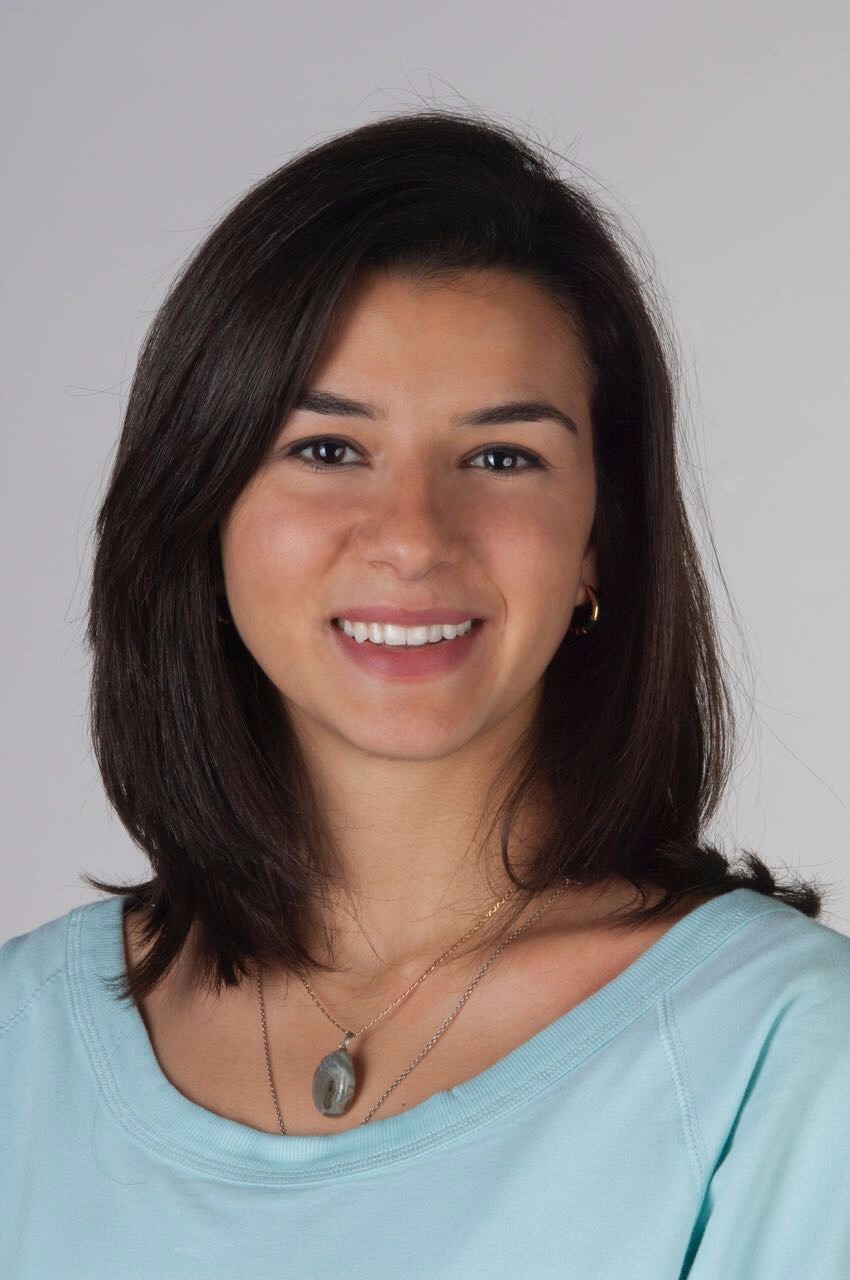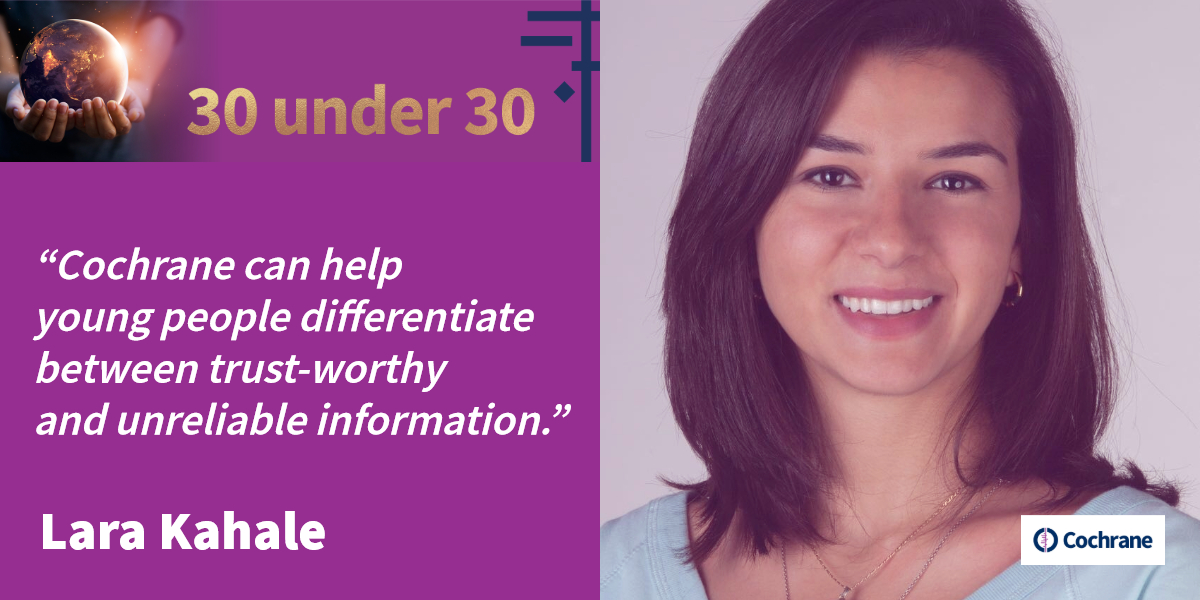
Cochrane is made up of 13,000 members and over 50,000 supporters who come from more than 130 countries, worldwide. Our volunteers and contributors are researchers, health professionals, patients, carers, people passionate about improving health outcomes for everyone, everywhere.
Cochrane is an incredible community of people who all play their part in improving health and healthcare globally. We believe that by putting trusted evidence at the heart of health decisions we can achieve a world of improved health for all.
Many of our contributors are young people working with Cochrane as researchers, citizen scientists, medical students, and volunteer language translators and we want to recognize the work of this generation of contributors as part of a new series called, Cochrane’s “30 under 30."
In this series, we will interview 30 young people, 30 years old or younger who are contributing to Cochrane activities in a range of ways, all promoting evidence-informed health decision making across the world.
We will be hearing from them in a series of interviewees published over the coming months.
We're keen to hear from you. Would you like to take part in this series? Do you know someone you'd like to see interviewed? Contact kabbotts@cochrane.org. Or if you want to know more about Cochrane’s work contact membership@cochrane.org where our community support team will be happy to answer your questions.

Name: Lara A Kahale
Age: 28
Occupation: AUB GRADE center coordinator at the American University of Beirut Medical Center, Beirut, Lebanon
Program: PhD candidate in Epidemiology at Utrecht University, Utrecht, the Netherlands
How did you first hear about Cochrane?
I was first introduced to Cochrane as a research assistant at the Clinical Research Institute at the American University of Beirut Medical Center (AUBMC) in 2012. The concept of systematic reviews was still very novel at AUBMC and in Lebanon. During my time there, I undertook Cochrane training modules on how to conduct systematic reviews and meta-analyses. I was very impressed with the rigorous methods described in these modules.
How did you become involved with Cochrane? What is your background?
As a registered nurse, I was trained to make clinical decisions based on evidence. Instead of just searching or reading the evidence, Cochrane paved the way for me to contribute to evidence synthesis. My first experience as an author with Cochrane was gained through the process of leading updates of six Cochrane systematic reviews on “anticoagulation with patients with cancer” with the Gynaecological, Neuro-oncology and Orphan Cancer Group (GNOC). This project allowed me to apply what I had learned in the modules as well as increase my knowledge and update my skills. It also allowed me to forge a very positive and beneficial relationship with the GNOC editorial team.
What do you do in Cochrane?
I am a Cochrane author on six systematic reviews with the GNOC Group and one review with the Cochrane Neonatal Group.
I was one of two lead authors, who in conjunction with the GNOC Group and the Project Transform Team, successfully participated in the Living Systematic Review Evidence pilot project. This process enables reviews to be continually updated, incorporating relevant new evidence as it becomes available. The concept of living evidence synthesis are of increasing interest to Cochrane’s stakeholders and are intended to provide a means seamless way to connect evidence and practice. This approach has only recently been possible due developments in linked data and machine learning. Our initial goal was to produce one living systematic review but due to the incredible commitment of the author team and support from the GNOC Group and Project Transform Team, we currently have three LSRs published on the Cochrane Library.
What specifically do you enjoy about working for Cochrane and what have you learnt?
Cochrane facilitates reaching out to and learning from experts in the field of evidence-based research. In particular, attending the annual Cochrane Colloquia is hugely motivating on a personal level and hugely beneficial for my continued learning. Through networking, I can easily follow-up and learn innovative and impactful work. Since the very first Colloquium I attended in 2014, I have felt like a “Cochranite”.
What are your future plans?
My future plans are to continue contributing to evidence synthesis and guideline development and adaptation. Also, I look forward to teaching evidence-based medicine after I complete my PhD studies.
In your personal experience, what one thing could Cochrane do better to improve its global profile?
One thing that I think Cochrane could do better is to increase funding opportunities to the members to undertake short-term visits to peer members to further their research experience and learn new techniques. This scheme would build research links and develop ongoing scientific collaboration.
What do you hope for Cochrane for the future?
I hope that Cochrane continues on providing this familial atmosphere for members as this is one of its major strengths. Also, I hope that Cochrane branch is established in the Middle East, a region in need for high-quality evidence that could serve its numerous health-related challenges. I would be very happy to be involved in any future discussions around this goal.

How important is it that young people get involved in Cochrane?
With the exponential growth of seeking medical information via the internet, it is tremendously important for young people to benefit from the concept of evidence-based practice. Cochrane very well facilitates this, especially with the availability of excellent learning packages.
Cochrane can help young people differentiate between trust-worthy and unreliable information.
What would your message be to other young people who want to get involved with Cochrane’s work but not sure where to start….?
Cochrane has provided several platforms for encouraging young people to get engaged like Cochrane crowd, task exchange, etc. Also, thanks to the spirit of openness, one can easily contact managing editors of any Cochrane group or network and receive answers on how to get involved. Last but not least, attending Colloquia is the most impactful method to see things in action and sign-up to any activity or project that advances one’s professional development.


